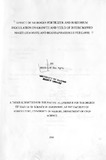| dc.description.abstract | Most studies on intercrops have not been conclusive. Nitrogen is one of the elements
that limit maize and bean production. Since symbiotic N fixation may provide a
substantial amount ofN in such a system, there is need to study the effect of fertilizer
Nand rhizobial inoculation on maize and beans in intercrops. Hence, effects ofN
levels and rhizobial inoculation on bean nodulation and yield of intercropped maize
and beans were investigated at Kabete Field Station, University of Nairobi over two
seasons in two sites. Treatments were bean inoculation with Rhizobium
leguminosarum biovar phaseoli (inoculated, non-inoculated) and N levels (0, 50, 100
and 150 kg N/ha) arranged in a factorial structure with three replications.
In season 2, there was significant interaction (P=0.05) between N levels and bean
inoculation such that maize grown in association with inoculated beans had
significantly higher yield than maize where beans were not inoculated at 0, 100 and
150 kg N/ha. This difference was not observed at 50 kg N/ha. Response to N for
maize grown in association with inoculated and non-inoculated beans differed. For
maize grown in association with inoculated beans, there was a yield increase with
increasing N levels, though 100 and 150 kg N/ha gave yields that were statistically
similar (P=0.05). For maize grown in association with non-inoculated beans,
application of 50 kg N/ha increased yield significantly. Increasing N beyond this level
had no effect on yield. This interaction was not observed in season 1 where increasing
N to 100 kg N/ha increased maize yield significantly (P=0.05). Further increase from
100 to 150 kg N/ha reduced yield. Maize grown in association with inoculated beans
had significantly higher yield than where beans were not inoculated. For beans,
inoculation increased yield significantly (P=0.05).
The results of this study imply that introduced rhizobia may have been superior in N
fixation through enhanced nodule activity and not nodule numbers. Both crops
probably benefited from this enhanced N fixation though maize also benefited from
fertilizer N. | en |

